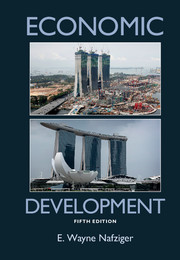Book contents
- Frontmatter
- Contents
- Preface to the Fifth Edition
- Abbreviations and Measures
- Part One. Principles and Concepts of Development
- Part Two. Poverty Alleviation and Income Distribution
- Part Three. Factors of Growth
- Part Four. The Macroeconomics and International Economics of Development
- 14 Monetary, Fiscal, and Incomes Policies and Inflation
- 15 Balance of Payments, Aid, and Foreign Investment
- 16 The External Debt and Financial Crises
- 17 International Trade
- Part Five. Development Strategies
- Glossary
- Bibliography
- Index
- Endpapers
17 - International Trade
from Part Four. - The Macroeconomics and International Economics of Development
Published online by Cambridge University Press: 05 June 2012
- Frontmatter
- Contents
- Preface to the Fifth Edition
- Abbreviations and Measures
- Part One. Principles and Concepts of Development
- Part Two. Poverty Alleviation and Income Distribution
- Part Three. Factors of Growth
- Part Four. The Macroeconomics and International Economics of Development
- 14 Monetary, Fiscal, and Incomes Policies and Inflation
- 15 Balance of Payments, Aid, and Foreign Investment
- 16 The External Debt and Financial Crises
- 17 International Trade
- Part Five. Development Strategies
- Glossary
- Bibliography
- Index
- Endpapers
Summary
Free trade means we can buy fresh-cut flowers from Colombia in the middle of winter, along with fresh fruit from Chile and fresh vegetables from Mexico. It means we are more likely to find the style and size of shirt we want on the shelves at department stores.…A 2004 study by the National Bureau of Economic Research [Broda and Weinstein] found that the real incomes of American families are about 3 percent higher because of the greater variety that imports bring. That translates to a real gain of $1,300 per person…just from the expanding varieties that trade has brought to the marketplace. (Griswold 2009:17)
Scope of the Chapter
This chapter discusses the relationship between trade and economic growth, arguments for and against tariff protection, the shift in less-developed countries’ (LDCs’) terms of trade, import substitution and export expansion in industry, developed countries’ (DCs’) import policies, expansion of primary export earnings, trade-in services, protection of intellectual property rights, foreign-exchange rate policies, LDC regional integration, global production networks (the borderless economies), and the protection of infant entrepreneurship.
Does Trade Cause Growth?
In the long run, liberal international trade is a source of growth (Sachs and Warner 1997; Baldwin 2003). Is the high correlation between trade and gross domestic product (GDP) per capita a result of income causing trade or trade causing growth? Jeffrey Frankel and David Romer (1999:379–99) test the direction of causation by constructing a measure of trade based on geographic characteristics rather than on income. They then use this measure to estimate the effect of trade, if any, on per capita income. They find that a 1 percentage point increase in trade to GDP increases income per person by 0.5 to 2 percent. Trade raises income mainly by spurring the growth of productivity per input; in addition, trade affects income by stimulating physical and human capital accumulation. Alan Winters (2004:F10–F15) attributes the productivity gains to increased import competition, technological improvements embodied in imports, export expansion, and learning through trade.
- Type
- Chapter
- Information
- Economic Development , pp. 571 - 630Publisher: Cambridge University PressPrint publication year: 2012



